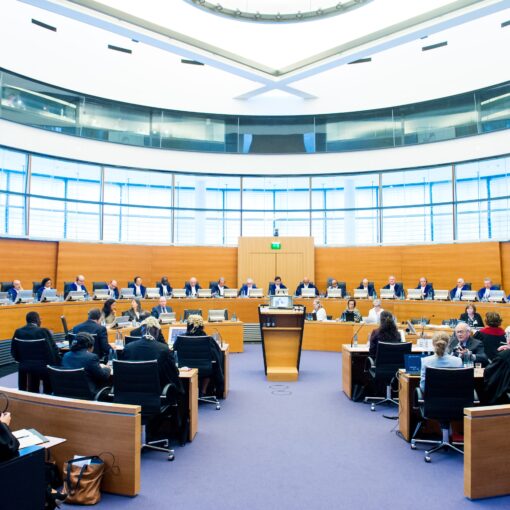
On the evening of the second inauguration of President Trump, the White House released a flurry of executive orders on a wide range of subjects. Several of them specifically concerned energy and the environment. The general thrust of these is to encourage the rapid development of fossil fuel resources and all associated infrastructure, and remove any regulatory obstacles; to reverse federal actions on climate change, energy efficiency, and environmental justice; and to prevent wind farms from being built on federal lands and waters.
These orders repeatedly invoke emergency authorities, though it is unclear the extent to which these authorities actually confer on the President the power to dictate these actions. As several of the orders acknowledge, it may be necessary to undertake formal rulemakings under the Administrative Procedure Act for many of these actions. A considerable amount of litigation will undoubtedly ensue.
These are the orders that appear to be of greatest energy and environmental significance. Other orders may also be relevant; this blog is a quick initial review.
“INITIAL RESCISIONS OF HARMFUL EXECUTIVE ORDERS AND ACTIONS”
- Revocation of most of President Biden’s executive orders on energy, climate change and many other matters
“PUTTING AMERICA FIRST IN INTERNATIONAL ENVIRONMENTAL AGREEMENTS”
- Withdraw from Paris Climate Agreement
- Withdraw from any other agreements made under UN Framework Convention on Climate Change (UNFCCC)
- Revoke any financial commitments under UNFCCC
- Revoke U.S. International Climate Finance Plan
“DECLARING A NATIONAL ENERGY EMERGENCY”
https://www.whitehouse.gov/presidential-actions/2025/01/declaring-a-national-energy-emergency/
- Declares national energy emergency, primarily based on high energy prices
- Use any lawful emergency authorities “to facilitate the identification, leasing, siting, production, transportation, refining, and generation of domestic energy resources.”
- Use Defense Production Act and federal eminent domain authorities
- Issue emergency fuel waivers to allow year-round sale of E15 gasoline
- “Expedite the completion of all authorized and appropriated infrastructure, energy, environmental and natural resources projects”
- Use emergency authorities and nationwide permits to grant approvals under Clean Water Act Sec. 404, Rivers and Harbors Act Sec. 10, and Marine Protection Research and Sanctuaries Act Sec. 103 for energy projects
- Use emergency consultation processes under Endangered Species Act, and frequent convening of Endangered Species Act Committee, for energy projects
- Use construction authority of Army Corps of Engineers
- The term “energy” is defined to mean “crude oil, natural gas, lease condensates, natural gas liquids, refined petroleum products, uranium, coal, biofuels, geothermal heat, the kinetic movement of flowing water, and critical minerals” [not wind or solar]
“UNLEASHING AMERICAN ENERGY”
https://www.whitehouse.gov/presidential-actions/2025/01/unleashing-american-energy/
- “eliminate the ‘electric vehicle (EV) mandate’ and promote true consumer choice … by terminating … state emissions waivers that function to limit sales of gasoline-powered automobiles; and by considering the elimination of unfair subsidies and other ill-conceived government-imposed market distortions that favor EVs”
- “safeguard the American people’s freedom to choose from a variety of goods and appliances, including but not limited to lightbulbs, dishwashers, washing machines, gas stoves, water heaters, toilets, and shower heads”
- Require all agency heads to review all existing regulations “that impose an undue burden on the identification, development, or use of domestic energy resources – with particular attention to oil, natural gas, coal, hydropower, biofuels, critical mineral, and nuclear energy resources”
- Attorney General “shall consider whether pending litigation against illegal, dangerous, or harmful policies should be resolved through stays or other relief”
- Revocation of many executive orders
- Terminate the American Climate Corps
- Council on Environmental Quality must propose rescinding its NEPA regulations
- CEQ to convene working group to expedite permitting approvals
- “all agencies must prioritize efficiency and certainty over any other objectives, including those of activist groups that do not align with the policy goals”
- “facilitate the permitting and construction of interstate energy transportation and other critical energy infrastructure, including … pipelines”
- In NEPA and other permitting reviews, “agencies shall adhere to only the relevant legislated requirements for environmental considerations and any considerations beyond those requirements are eliminated”
- Disband Interagency Working Group on the Social Cost of Greenhouse Gases; all of its guidance, recommendations, etc. are withdrawn
- Consider eliminating the “social cost of carbon” calculation
- EPA in collaboration with other agencies shall submit recommendations to OMB “on the legality and continuing applicability” of the greenhouse gas endangerment finding of 2009
- Immediately pause disbursement of funds appropriated through Inflation Reduction Act or Infrastructure Investment and Jobs Act; review processes for issuing grants, loans, contracts, or any other financial disbursement of appropriated funds
- Secretary of Energy to restart reviews of applications for approvals of LNG export projects
- Maritime Administration to review approvals for proposed deepwater ports for LNG export
- “identify all agency actions that impose undue burdens on the domestic mining and processing of non-fuel minerals and undertake steps to revise or rescind such actions”
“UNLEASHING ALASKA’S EXTRAORDINARY RESOURCE POTENTIAL”
- Expedite permitting and leasing of energy and natural resource projects in Alaska
- Prioritize development of Alaska’s LNG potential
- End restrictions on development of Arctic National Wildlife Refuge and certain other areas in Alaska
- Numerous other actions to facilitate energy development in Alaska
“TEMPORARY WITHDRAWAL OF ALL AREAS ON THE OUTER CONTINENTAL SHELF FROM OFFSHORE WIND LEASING AND REVIEW OF THE FEDERAL GOVERNMENT’S LEASING AND PERMITTING PRACTICES FOR WIND PROJECTS”
- Stop leasing of federal waters for offshore wind
- Issue no new or renewed approvals, rights of way, loans for onshore or offshore wind projects
- “consider the environmental impact of onshore and offshore wind projects upon wildlife, including, but limited to, birds and marine mammals”
“PUTTING PEOPLE OVER FISH: STOPPING RADICAL ENVIRONMENTALISM TO PROVIDE WATER TO SOUTHERN CALIFORNIA”
- Restart work “to route more water from the Sacramento-San Joaquin Delta to other parts of the state for use by the people there who desperately need a reliable water supply”
- “The recent deadly and historically destructive wildfires in Southern California underscore why the State of California needs a reliable water supply and sound vegetation management practices in order to provide water desperately needed there”
“DELIVERING EMERGENCY PRICE RELIEF FOR AMERICAN FAMILIES AND DEFEATING THE COST-OF-LIVING CRISIS”
- Among many other actions, “eliminate counterproductive requirements that raise the costs of home appliances”
- “Eliminate harmful, coercive ‘climate’ policies that increase the costs of food and fuel”
“ENDING RADICAL AND WASTEFUL GOVERNMENT DEI PROGRAMS AND PREFERENCING”
- Terminate all environmental justice offices, positions, programs, and activities

Michael Gerrard
Michael Gerrard is Andrew Sabin Professor of Professional Practice and founder and faculty director of the Sabin Center for Climate Change Law. He is former chair of the faculty of the Columbia Earth Institute and of the American Bar Association's Section of Environment, Energy and Resources. He practiced environmental law full-time in New York from 1979 to 2008, and has written or edited 14 books on environmental law.




